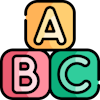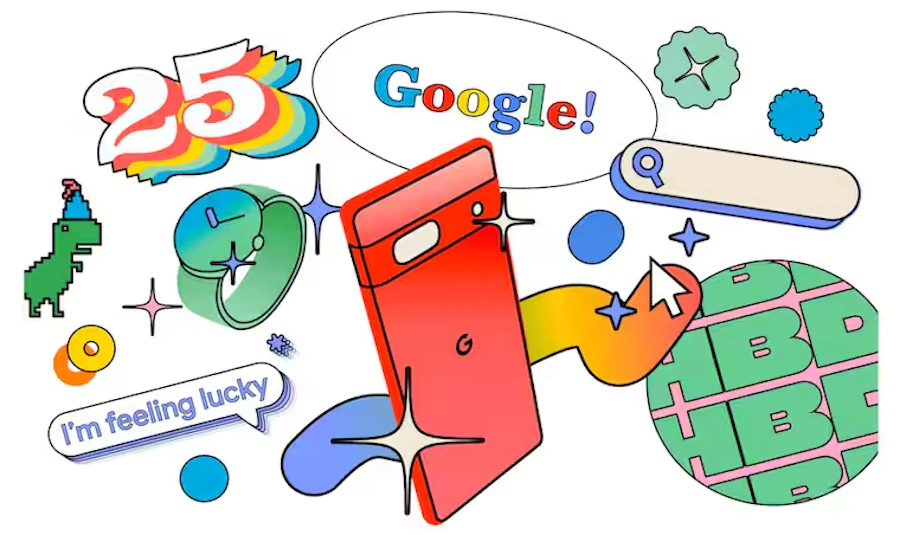 Alphabet, parent of Google
Alphabet, parent of Google
From a garage to a tech empire, Google has shaped the internet, AI, and daily life
Now a Mag7 company, Google's journey began as a simple search engine project and evolved into one of the most powerful, and richest, tech companies in history. The journey began in 1995 at Stanford University in Palo Alto, California, when graduate students Larry Page and Sergey Brin met while working on a digital library project. Their unique chemistry and abundant creativity led first to the development of "Backrub", an early search engine that ranked pages based on backlinks, and today's powerhouse, Google.
Backlinks (later called PageRank), also referred to as "inbound links" or "external links", are links from one website to another. They are a core part of search engine ranking because they act like votes of confidence and importance. When a reputable site links to another site, search engines see the content as more trustworthy and authoritative. Page and Brin saw the chaos of the early World Wide Web and found a solution in Backrub's ability to rank webpages, making them more relevant to search.
With the success of Backrub, Page and Brin registered google.com on September 15, 1997. The name "Google" is a play on the word "googol", which is the number 1 followed by 100 zeros. The name was chosen to symbolize vast information. On September 4, 1998, Google incorporated as a company in a Silicon Valley garage rented, coincidentally, from future YouTube CEO Susan Wojcicki. A few days later, the first Google Doodle was drawn; a Burning Man stick figure to show they were out of office. Google moved to its now-famous Googleplex Headquarters in Mountain View, California, in 1999. And in one of the greatest missed opportunities of all time, Yahoo, the leader in search at the time, had a chance to buy Google for one million dollars, a decision they would soon come to regret as Google quickly passed Yahoo as the leading search engine.

Going Public and the Dot-Com Boom (2000-2005)
In the year 2000, Google becomes the top search engine on the internet, and launches pay-per-click ads, called AdWords, which becomes its main source of revenue. Yahoo partners with Google for search, before later trying--and failing--to compete.
'Don't be Evil' or 'Do the Right Thing' or
fuhgeddaboudit
Google's motto, "Don't
be evil," has been part of its corporate code of conduct since 2000.
This guiding principle was intended to ensure that the company acted
ethically and did good things for the world, even at the cost of short-term
gains. In 2015, when Google was reorganized under the parent company
Alphabet, the motto was slightly adjusted to "do the right thing". The
phrase was deeply embedded in Google's culture, but was retired in 2018.
Are you feeling lucky? Well, are you punk?
The "I'm
Feeling Lucky" button, a familiar feature of Google's search engine, is a
digital shortcut that takes users to the top search result page without
displaying the full list of search results. The purpose and functionality of
"I'm Feeling Lucky" are rooted in Google's early days, where it served as a
testament to the search engine's confidence in its ability to deliver the
most pertinent result on the first try. When a user types a query into
Google's search box and clicks on "I'm Feeling Lucky," they are immediately
redirected to the website that Google's algorithm has identified as the best
match for the query.
In 2001, Eric Schmidt becomes Chief Executive Officer, taking the reins from Page and Brin. A former head of Novell, a leading networking company, Schmidt joins as CEO to run Google, allowing Page and Brin to focus on using their technical talents to bring innovations to Google.
On August 19, 2004, Google goes public with an IPO (NASDAQ: GOOG) at $85 per share, now worth thousands. The same year, Gmail launches as their email service. They provide 1GB of storage compared to competitor Hotmail's 2MB. Hotmail was acquired by Microsoft and now operates as outlook.com, although hotmail.com email addresses still work.
In 2005, Google launches Maps, an application that revolutionized navigation. Also, Google buys Android Inc. for $50 million. Android was founded by Andy Rubin, an American programmer and entrepreneur. Android, an operating system based on a modified version of the Linux kernel and other open-source software, is now the world's biggest mobile Operating System (OS).
The first Google Doodle
Expansion and Dominance (2006-2015) 🚀
2006: YouTube Acquisition. Google buys YouTube for $1.65 billion, a huge amount at the time, but now worth over 200 billion dollars.
2008: Chrome Browser and Android's First Phone. Google Chrome launches, eventually dominating the browser market, toppling Microsoft's Internet Explorer. T-Mobile G1 HTC Dream, the first Android phone, debuts.
2010: Google's First Self-Driving Car. The ultra-secret Waymo project begins, later spun off in 2016. Today, Waymo taxis are a fixture in San Francisco and other markets.
2011: Larry Page Returns as CEO. Eric Schmidt steps down and Larry Page takes over. Google+ launches and later fails.
2015: Alphabet Restructuring. Google reorganizes under Alphabet Inc., with Sundar Pichai becoming Google CEO.
AI, Cloud, and the Modern Era (2016-Present) 🧠
2016: AI and Assistant take off. Google Assistant launches, competing with Siri and Alexa. "Hey, Google!" DeepMind's AlphaGo beats the world champion Lee Sedol in the game of Go, a major milestone in AI.
2018: GDPR and privacy scrutiny. Fines over anti-trust are costly, and data privacy issues begin piling up.
2020: Pandemic and the Remote Work boom. Google Meet and Workspace expand as remote work surges.
2023: Bard AI and Gemini. Google launches Bard AI, later upgraded to Gemini, to compete with ChatGPT.
2024: AI and the Quantum Computing initiative. Gemini version 1.5 releases with a one million token context window. Quantum computing breakthroughs continue.
 What's Next for Google?
What's Next for Google?
- AI-first future with Gemini, DeepMind, robotics, and more.
- Supremacy in quantum computing.
- Possible antitrust breakup with the ongoing U.S. Department of Justice case.
